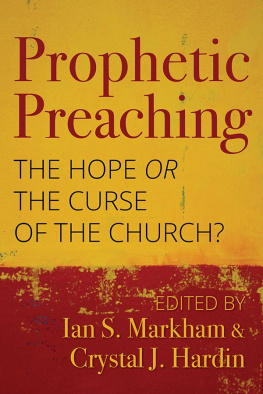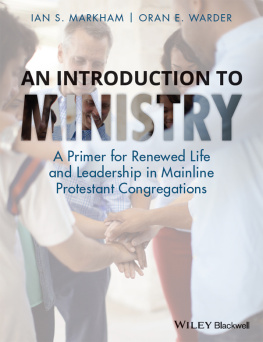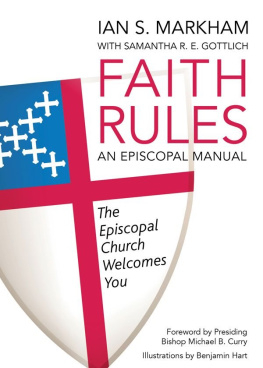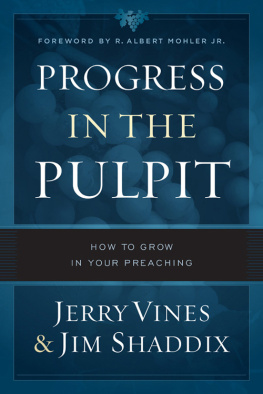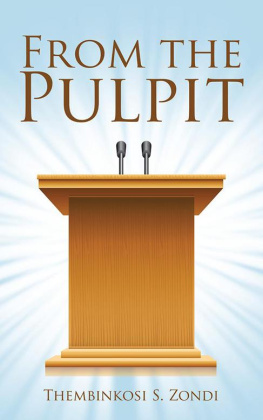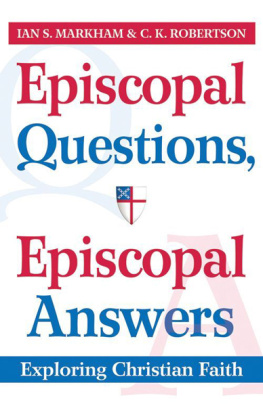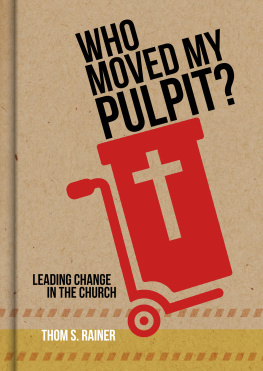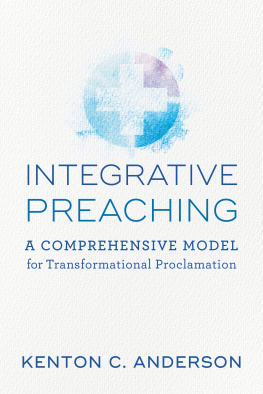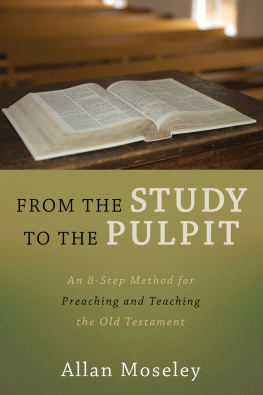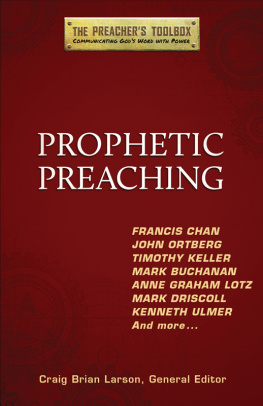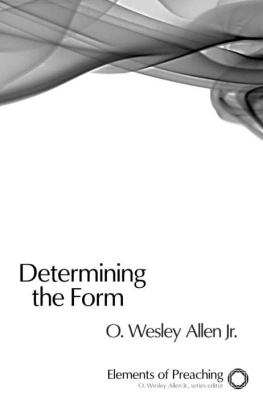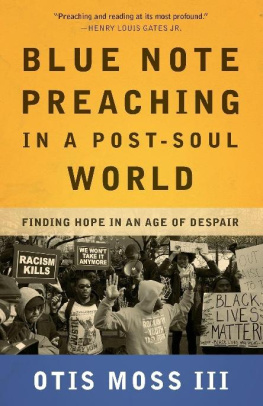

Copyright 2020 by Ian S. Markham and Crystal J. Hardin
All rights reserved. No part of this book may be reproduced, stored in a retrieval system, or transmitted in any form or by any means, electronic or mechanical, including photocopying, recording, or otherwise, without the written permission of the publisher.
Unless otherwise noted, the Scripture quotations are from New Revised Standard Version Bible, copyright 1989 National Council of the Churches of Christ in the United States of America. Used by permission. All rights reserved worldwide.
Church Publishing
19 East 34th Street
New York, NY 10016
www.churchpublishing.org
Cover design by Jennifer Kopec, 2Pug Design
Interior design and typesetting by Beth Oberholtzer
Library of Congress Cataloging-in-Publication Data
Names: Markham, Ian S., editor. | Hardin, Crystal J., editor.
Title: Prophetic preaching : the hope or the curse of the church? / edited by Ian S. Markham and Crystal J. Hardin.
Identifiers: LCCN 2019046663 (print) | LCCN 2019046664 (ebook) | ISBN 9781640652200 (paperback) | ISBN 9781640652217 (epub)
Subjects: LCSH: Preaching. | Christianity and politics--Episcopal Church. | Prophecy--Christianity.
Classification: LCC BV4235.P7 P765 2020 (print) | LCC BV4235.P7 (ebook) | DDC 251--dc23
LC record available at https://lccn.loc.gov/2019046663
LC ebook record available at https://lccn.loc.gov/2019046664
Ian S. Markham and
Crystal J. Hardin
Politics matters. Unlike sport or food or music, our political preferences are often defining. We are appalled. We are afraid. We are passionate. We are hopeful. Our language reflects the depth of our convictions. We are not neutral. And, what we believe politically is absolutely shaped by what we believe as Christians. The political really matters.
For the clergyperson, there is a weekly opportunity to share our political convictions. It is called the pulpit. Each week, we find ourselves bringing our political selves into the task of preparing to preach. In most churches, the pulpit is above the congregation; the preacher addresses the congregation just after the reading of the gospel. It is an awesome opportunity or, perhaps, temptation.
This issue is acute in todays church. Many clergy in the Episcopal Church are advocating and developing a prophetic preaching voice in response to a landscape marked by increasing polarization and politicization. Often, this involves preaching sermons with direct political themes (and calling for others to do the same). While many congregants respond positively to this, others respond quite negatively. The Episcopal Church, it seems, is no more immune to the temptation of polarization than the secular world. Episcopalians in the conservative minority are often very uncomfortable with politically themed sermons, while liberal Episcopalians may demand the political message from the pulpit. Herein is the problem. The preacher occupies a particular political identity that may be in keeping with, or out of step with, some of those in his or her care. What is a preacher to do? This book offers a collection of essays from a range of preachers working within the Episcopal tradition on the role of the preacher in addressing political issues. Contributors work in varied locations (for example: Houston, Richmond, London, Washington, DC) and embody varied vocational callings (for example: bishop, rector, professor, college chaplain), offering perspectives enhanced by diversityfrom age, race, and gender to preaching experience, prior careers, and political leanings. This book has the spectrum. Republicans and Democrats are in this book. Advocates of political preaching sit alongside those who think that political preaching is a key reason why the Episcopal Church is in trouble.
While this book seeks to promote and even to produce purposeful conversation around the question of preaching politics (and its interrelationship with prophetic preaching as our current age understands it), this cannot be done apart from engagement with a rather more fundamental question: what is the role of the preacher? This book engages that question necessarily, as it reflects on the answers to it in light of our increasingly polarized society.
In March 2019, contributors gathered at Virginia Theological Seminary to reflect on this project and to offer their opinions, as represented by their essays, amongst their colleagues. As each essay was shared, a rich conversation took place, both on small matters of agreement and critique about individual essays, and on larger matters of understanding (and misunderstanding) about what it means to pastor and to preach in todays political climate. This conversation greatly enhanced the essays that follow, in that each contributor had the opportunity to receive feedback on their essay, which many then incorporated into their finished work. This book then is, truly, the sharing of a dialogueit is a product of civil, prayerful conversation amongst preachers with differing theological and political viewpoints resulting in thoughtful, contextual approaches to the politics of preaching and the preaching of politics.
In chapter 1, Preaching Politics: Not Yes or No, but How, Crystal Hardin introduces a taxonomy of the preaching model into which Episcopal preachers appear to be ordering themselves in response to the debate around preaching politics. Critiquing this taxonomy, she promotes instead an alternative vision that could be claimed by the preacher: that of faithful, fellow wrestler. Sarah Condon, in chapter 2, addresses The Dangerous Potential of the Prophetic Pulpit, leveling sharp critique at the self-professed prophetic preacher, while offering keen observations about the effect of such preaching on diminishing Episcopal congregations. Phoebe Roaf, in chapter 3, Addressing Power, urges preachers to recognize the inherent power that exists in preaching and in the congregations who receive the Episcopal sermon. She offers a thoughtful process for crafting sermons, one that is aware of the prophetic tradition and pays due attention to scripture, prayer, and context. Roafs chapter stands in the tradition of the prophetic as inherently communal and aimed at structures of sin. In chapter 4, Remember Jesus: The Purpose of the Pulpit, Russ Levenson sets out a purpose for preaching that aligns with Jesuss prayer in Gethsemane, one that focuses above all on reconciling humans to Christ and to one another. Boldly, Levenson proclaims that more is needed than a human solution to a spiritual problem. Alex Dyer agrees with this proposition, yet writes from a different perspective altogether. In chapter 5, Reclaiming the Prophetic Pulpit, he challenges progressive preachers to reclaim the prophetic pulpit, allowing scripture to act as sure foundation for comforting the afflicted and afflicting the comfortable. In chapter 6, Preaching the Jesus Movement, Stephanie Spellers speaks to preaching the Jesus Movement, making the claim that authentic, faithful preaching is always prophetic and urging preachers to consider that neither prophetic preaching nor the Jesus Movement are optional for those who wish to serve Jesus and call others into that service. In chapter 7, The Political Work of the Church: Go for the Underlying Issues, Ian Markham argues that preaching should always be set in an eternal context; preachers would do well to develop a capacity to read the signs of the time such that underlying anxieties and dispositions can be addressed by the preacher in a framework eternal. In chapter 8, Prophetic Preaching as Sacrament: Finding and Using a Political Voice, Ruthanna Hooke similarly calls for a deeper, more nuanced understanding of the times in which we live, suggesting that this reorientation to what lies beneath troubled waters may meet the need for sacramental preaching that is political without being partisan, truthful as well as loving, and that can reach us in our soul-weary captivity to the powers. In chapter 9, Getting the Basics Right, Samuel Wells examines the topic at issue from the

